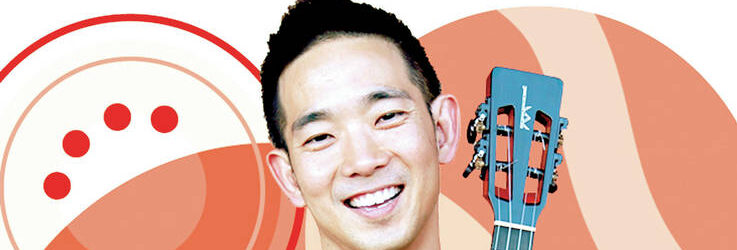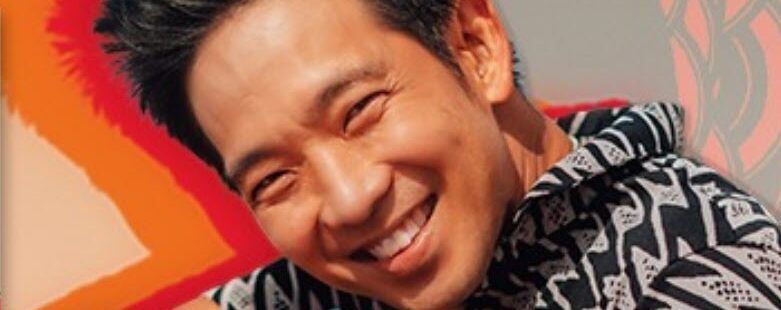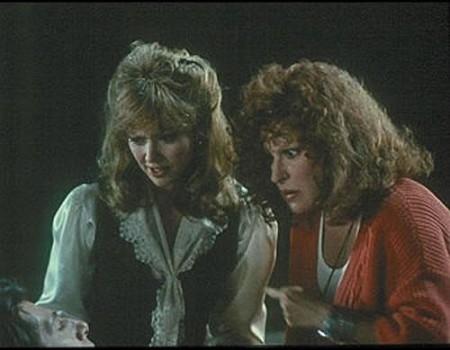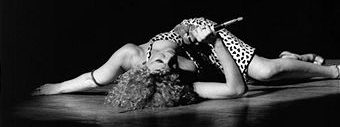Santa Barbara Independent
Ukulele God Comes to Carpinteria
Jake Shimabukuro Brings His Strings to the Plaza Playhouse
By Lauren Carter
Sunday, February 12, 2012
Ever since his YouTube video of “My Guitar Gently Weeps” exploded onto the Internet in 2006, ukulele master Jake Shimabukuro’s star has been skyrocketing across the United States and Japan, evidenced by a shower of albums, steady string of concerts, and high profile performances on TV shows that matter.
This Monday, February 13, he brings his uke to Carpinteria’s recently refurbished and refocused Plaza Playhouse. The show’s already sold out, but we figured it would be good to catch up with Shimabukuro anyway, and he answered a few of our questions last week.
Do you have any advice for those hoping to pick up the ukulele?
The main thing is just to learn a few chords and play songs you love. The thing about the ukulele is that you can get such a joy just out of hearing it, it’s almost therapeutic just listening to a simple C major chord. I’ve been fortunate enough to meet a lot people through it. I saw Bill Gates and learned that he loves ukulele too and loves playing it, same with Warren Buffet, guys that have everything in the world but love to just sit back and strum the ukulele. That in itself says a lot about the instrument.
What would be your dream collaboration?
There are so many people! Bob Dylan, Paul McCartney. It was a dream-come-true for someone like Yo-Yo Ma to just be humble enough to sit with a little Asian guy like me with my ukulele.
He’s the nicest guy and his passion and love he shows in his instrument onstage really comes through when you speak to him offstage as well.
How do you find inspiration for your music?
Just being around people, different kinds of people. Interaction with people, music is all about communicating and being able to relate and be sensitive to the energy around you and to be able to tap into that energy and experience it, feel it and reciprocate it. That’s what it’s all about, it’s not about the song or note or chord or technique it’s about a feeling, something that you’re trying to convey and infect the audience with.
What was one of your favorite concerts that you’ve played?
I was most nervous a few years ago when I performed with Bette Midler; we did a show for Queen Elizabeth. For one thing, singing with Bette Midler was the duet of my life. She’s one of my all time favorite singers and just standing with her and playing the ukulele, I was in heaven. Not to mention that we were in front of the queen! After the show, I got to meet the queen and oh my goodness that was over the top, I still can’t believe that happened. It is definitely one of my most treasured moments.
Tell us a little bit about Music is Good Medicine and how you became involved?
It’s a program that has been around for at least 12 years now. I would go with a doctor and perform at the schools and just share my passion. Then we would tie that into medical things like proper nutrition, exercise that kind of thing. We would also go to senior citizen homes and play music and then teach them about signs of strokes and things like that. Music is very healthy and
so it was a neat way to bring music and medicine together for something people were really receptive to.
Recently the program lost some funding so we haven’t been really active but I’ve still been going to the schools and playing for them. I really believe in the program because with kids you have to encourage them to explore their passion and get them excited about stuff. They seem lost, you know?
I remember when I was in elementary school, I was always excited about stuff. I wanted to be all kinds of things: pilot, astronaut. When I was a kid there was no such thing a solo ukulele musician who traveled and played. I feel so fortunate. I’m so appreciative of all the opportunities and I don’t know how long it will last but I’m trying to learn as much as I can. Music is just an endless journey there’s just so much to learn and the more you learn the more you realize you didn’t know but you have to accept and enjoy the process.
What is one of the most difficult parts about adapting music to the ukulele? Are there any styles that are challenging in particular?
It’s always a challenge but I’m so stubborn, so I’ll keep working at it and keep adapting and adjusting it. Bottom line, you just have to be honest. It’s all about honesty and telling yourself, “Hey know what? It’s a ukulele with only four strings and 2 octaves” if I’m trying to cover a classical piece of music, or something like Queen’s “Bohemian Rhapsody” and be realistic and be honest with myself as long as I feel like it was the best I could do in that moment. As long as I know I put in the effort and blood sweat and tears I can feel good about it. I consider every song I’ve ever played as a work in progress because I think music should always be changing. Everyone wants to feel like they’re changing and growing every day and if you’re an artist, your art form should evolve as you evolve.
Tell me a little bit about your new Peace Love Ukulele transcription book that recently went on sale.
Peace Love Ukulele was my first transcription book and it was quite an honor to work with Hal Leonard and his publishing company on that. It’s been a really big deal to me, I’m excited to see it out finally. Then, next month, I have my first full length documentary from PBS which is premiering at the San Francisco International Asian American Film Festival.
Do you ever miss Hawaii when you’re on the road?
I miss being home but I love playing and getting up on stage and connecting with people. It’s such a thrill for me to experience. I try to keep everything balanced and spend a lot of time with my family at home and then when I go out on road I’ll shift my focus to my music. The balancing act is always a struggle but when things get crazy I try to take a step back, look at the bigger picture and say, “Hey man, there’s nothing to complain about. I’m surrounded by good people, my family is healthy and happy. Life is really good.”







